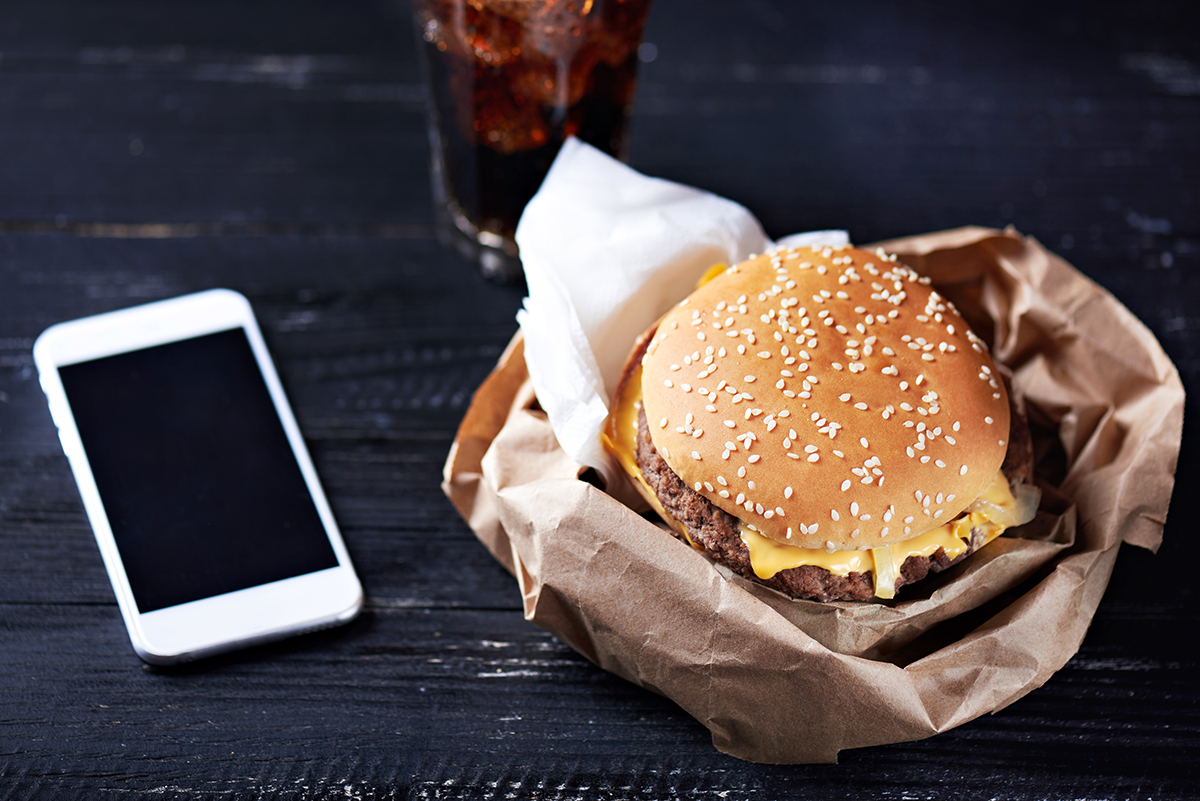Top Stories
Our Fast Food Social Media Diet
In this age of omnipresent social media, our greatest challenge may be figuring out how to take advantage of the benefits of the technology that can connect us to each other without suffering serious social costs.

If you want to become a miserable partisan who spends more time being angry at people you have never met than enjoying the company of friends, neighbors, and loved ones, then Twitter is the place for you. Social media platforms can be useful. I have made a number of personal and professional contacts on Twitter. And, if calibrated correctly, it offers valuable exposure to a wide range of ideas. But Twitter is also, as the cool kids say, a dumpster fire. It is too frequently an arena in which professional adults throw emotional and bigoted tantrums that most parents would not tolerate from very young children. And Twitter is certainly not the only platform for this kind of behavior. The more I learn about Facebook as a company, the more I dislike it. I deactivated my account. Intoxicated by feelings of moral righteousness, we yell past one another while our tech overlords busy themselves with hacking the human brain and annihilating any trace of cognitive freedom.
It isn’t hard to get people to agree that social media is often bad for our wellbeing, distorts our views about those with different beliefs, and serves as a poor substitute for face-to-face social experiences. Yet, we can’t seem to get enough of it. Around 70 percent of American adults (90 percent of young adults) use at least one social media platform and the majority of users are on social media every day. The numbers are similar or even higher in other nations such as Canada, Australia, and the United Kingdom. A recent survey from Common Sense Media found that more than two-thirds of American teens (up from around 50 percent six years ago) would rather interact with their friends online than face-to-face. According to Pew Research Center, 26 percent of American adults are online almost constantly. This number shoots up to 36 percent when just looking at Americans aged 30 to 49, and 39 percent for Americans aged 18 to 29. Pew also finds that 54 percent of teens worry that they spend too much time on their phones, and 51 percent report that their parents are sometimes or often distracted by their phones when they are trying to talk to them.
Why are we so drawn to social media when we seem to intuitively understand it isn’t particularly healthy and can be a barrier to a good life offline? A useful way to address this question is to view social media as similar to fast food. Why is fast food such a popular way to meet caloric needs? For one, it is convenient for modern life. People know that home cooked meals tend to be healthier but it takes time and energy to prepare them. In our hectic lives, it is much easier to hit the drive-thru or order take-out than to cook a meal from scratch at home. Likewise, it is often easier to interact with others on social media than to participate in face-to-face social activities.

In addition, like convenience food companies, the social media industry has seduced us by concocting a product that takes advantage of characteristics and inclinations that we possess because they helped our ancestors survive and reproduce. In the case of caloric needs, our brains orient us toward seeking lots of calories, fats, and sugars. In the case of social needs, our brains orient us toward vigilantly monitoring the social world and maintaining good relational and moral standing within our close networks and broader tribes. This modern social diet, however, undermines healthy socializing and contributes to growing social problems of loneliness, social disengagement, and tribal conflict just as a fast or junk food diet undermines healthy eating and contributes to a range of health problems.
Making matters worse, social disconnection may make the modern social diet all the more enticing. To those who feel isolated, rejected, or lonely, social media offers an opportunity to engage in what researchers call social snacking—seeking social gratification in passive or indirect ways that do not involve real social interaction. Online social snacking behaviors such as scrolling through Twitter, Facebook, and Instagram feeds are motivated by, but do not fulfill, belongingness needs. Indeed, researchers have found a positive association between loneliness and Facebook use,1 and that passive Facebook use in particular decreases wellbeing.2 Other studies similarly find that the more time adolescents spend using electronic devices, and the less time they are engaged in non-screen related activities, the lower their wellbeing.3 Experimental research further shows that the presence of a cellphone decreases the enjoyment of face-to-face interactions.4 Platforms like Twitter also provide a place for people to advertize virtue and tribal allegiance by joining attacks against ideological foes or anyone perceived as a heretic. But such behavior is not a recipe for healthy, stable, and enduring social ties and leaves people vulnerable to becoming the target of such attacks themselves.
It is worth taking a step back and considering just how dramatically technology is changing how we engage the social world. I’m writing this column from a hotel room in Chicago. To get here from my home in North Dakota required nearly zero human interaction. I booked my flight online and received my boarding pass from a computer. The only real social encounter I experienced at the airport was thanks to the interactive security theatre provided by the TSA. On the plane, like nearly everyone else, I had my own digital entertainment cued up. Why have a conversation with the random lady next to me when I can listen to Sam Harris have an undoubtedly more interesting conversation with his latest guest?
When I arrived in Chicago, the Uber app was all I needed to make my way to the hotel. I’m sure I could have chatted with the driver but I was too immersed in that so-long-it-should-have-been-an-OpEd Twitter thread that was going to finally fully reveal to the world the total hypocrisy and intellectual bankruptcy of the Left. Or was it the Right? Once I arrived at the hotel, after a brief check in with the clerk (self-check-in kiosks will probably be replacing them soon), I went to my room and used my phone to scout out nearby restaurants. No need to directly ask a person about a good place to eat and how to get there when I can so efficiently access that information using the internet. It is still within our power to explore a city without our digital assistants, but increasingly few of us do so. Why experience uncertainty and “waste time” when the Google gods can plot our path?
Many will be quick to correctly point out that my anecdote doesn’t involve lost meaningful social encounters. Brief interactions with strangers are not exactly the ingredients of a rich social life. In fact, one could argue that by making many aspects of our lives more efficient, technology actually gives us more freedom to focus on real relationships. And yet, by many metrics, people today are less socially connected to their family, neighbors, and community than people of past generations.
In addition, seemingly superficial face-to-face social encounters may have unappreciated social value, and increasingly interacting with machines instead of people may have real social costs; studies find that brief interactions with strangers can benefit wellbeing. What we often think of as trivial interpersonal encounters may also help developing minds learn how people work and help the rest of us keep our social skills sharp. Just like cooking is a skill that takes practice, so does socializing; our modern fast food social diet may reduce people’s ability to navigate the real social world. Perhaps people are less tolerant of those who have different views because they can easily go online and avoid or mock them.
Science fiction movies often feature human-like robots who just aren’t quite human enough. They can’t figure out how to successfully interact with others. Sometimes they lack empathy or moral concern, making them appear indifferent and even hostile towards people. Sometimes they are simply socially awkward, unable to correctly or quickly assess a social situation and respond with the appropriate emotions or words. The common narrative is that no matter how much they look and sound like us, robots aren’t and will never be like us—they will always lack a social soul. In real life, robotic engineers are working to build robots that mimic human sociality, for our benefit, of course. People are more likely to have positive feelings towards and thus want to buy or use robots if they display the social characteristics we find naturally appealing. In this age of omnipresent social media, our greatest challenge may be figuring out how to take advantage of the benefits of the technology that can connect us to each other without suffering serious social costs. If we don’t figure this out, in the future, we might not be asking how we can make robots more like us, but how we became more like them, or worse.
References:
1 Hayeon, S. et al., (2014) Does Facebook make you lonely? A meta-analysis. Computers in Human Behavior, 36, 446-452.
2 Verduyn, P. et al., (2015). Passive Facebook usage undermines affective wellbeing: Experimental and longitudinal evidence. Journal of Experimental Psychology: General, 144, 480-488.
3 Twenge, J. M., Martin, G. N., & Campbell, W. K. (2018). Decreases in psychological well-being among American adolescents after 2012 and links to screen time during the rise of smartphone technology. Emotion, 18, 765-780.
4 Dwyer, R. Kushlev, K. & Dunn E. (2018). Smartphone use undermines enjoyment of face-to-face social interactions. Journal of Experimental Social Psychology, 78, 233-239.






